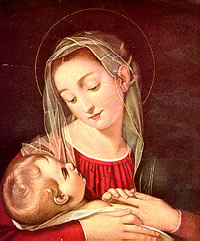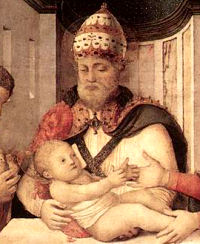When the fullness of time had come, God sent his Son, born of a woman … so that we might receive adoption. (Galatians 4:4-5)
Our mothers usually know what’s best for us—and that’s especially true of our mother Mary. So on a day when we celebrate her feast day and make New Year’s resolutions, let’s ask Mary what she would want us to do. What is one transforming truth that Mary would want us to carry with us throughout this new year?
Perhaps she would echo Paul’s words from today’s second reading: Through baptism we have become sons and daughters of God. Most of us have already heard this truth, but does it sustain us in our daily lives? Has it become one of the central guiding principles of our lives? To answer that question, it may help to explore what it means to be a child of our heavenly Father.
First and foremost, being children of God means that we aren’t orphans, left alone in the world to fend for ourselves. No, God loves and treasures us more than we can ever comprehend. He has called us his own, and he will never forsake us (Hebrews 13:5).
Second, being a child of God means that we carry the “family name.” This is our identity. Not only does it define who we are, it also tells us what we can become as we learn to cooperate with God’s grace. It even tells us that we can come to bear a resemblance to our heavenly Father because we are sharing in his very nature (2 Peter 1:4)!
So while you’re formulating your New Year’s resolutions today, ask Mary to guide you. Each day of this coming year, make it a point to remind yourself of who you are, where you came from, and where you are going. Live as the son or daughter that you are. It will make your Mother very happy!
“Mary, pray for me throughout this year so that I can walk in the dignity that your Son has won for me!”
Questions for Reflection or Group Discussion
(Numbers 6:22-27; Psalm 67:2-3,5-6,8; Galatians 4:4-7; Luke 2:16-21)
1. In the first reading, Aaron and his sons are instructed through Moses how to bless the Israelites. How often do you invoke similar blessings over your family and friends? Would you be willing to pray a blessing over family members once a week during 2012? If not, why not? If you have children at home try using the prayer in the first reading to pray over them in the evening, before bed, or in the morning.
2. In the responsorial psalm, once again we ask the Lord to “bless us” and “let his face shine upon us.” We also ask the Lord to permit us to praise him: “may all the peoples praise you.” As you reflect on the last year, what are the things the Lord has done for you that merit your thanks and praise?
3. In the second reading, St. Paul tells the Galatians and us that we are not only sons, we are also heirs! That is why we can cry out, “Abba Father” (Abba means daddy in Aramaic.) What does it mean to you to know that through faith in Jesus Christ, you are an adopted son/daugher and heir of your Heavenly Father? What qualities or attributes of your Heavenly Father do you want most for your life? What steps are you willing to take to receive them and act on them?
4. In the Gospel, we see how grateful the shepherds were (“glorifying and praising God”). In the Eucharist, we have an honor even greater than theirs. We get to receive into our hearts and body the very God they worshiped. How can you better prepare for that moment when you receive Jesus in the Eucharist?
5. The Gospel also says that Mary spent time “reflecting” in her heart the truths she heard from the shepherds. During this season of New Year’s resolutions, is it possible that God is inviting you to take on Mary’s approach by setting aside time each day to quiet your mind and reflect on who he is and what he has done? If so, are you willing to say yes? If not, why not?
6. The meditation further challenges us with these words “Each day of this coming year, make it a point to remind yourself of who you are, where you came from, and where you are going. Live as the son or daughter that you are.” As you begin the New Year, are you willing to commit to a daily time of prayer? Why or Why not? If you already have a daily prayer time, how can you structure your prayer time in order to spend a little less time presenting your list of needs to God, or trying to move his will, and more time reflecting on his words in Scripture and his will for your life?
7. Take some time now to ask Mary to pray that you would receive the grace needed to live your life in the dignity you have as a beloved son or daughter of your heavenly Father. Use the prayer at the end of the meditation as the starting point.

 A plenary indulgence may be gained by reciting or singing the hymn
A plenary indulgence may be gained by reciting or singing the hymn  The solemnity of 1 January, an eminently Marian feast, presents an excellent opportunity for liturgical piety to encounter popular piety: the first celebrates this event in a manner proper to it; the second, when duly catechised, lends joy and happiness to the various expressions of praise offered to Our Lady on the birth of her divine Son, to deepen our understanding of many prayers, beginning with that which says: "Holy Mary, Mother of God, pray for us, sinners."
The solemnity of 1 January, an eminently Marian feast, presents an excellent opportunity for liturgical piety to encounter popular piety: the first celebrates this event in a manner proper to it; the second, when duly catechised, lends joy and happiness to the various expressions of praise offered to Our Lady on the birth of her divine Son, to deepen our understanding of many prayers, beginning with that which says: "Holy Mary, Mother of God, pray for us, sinners."  The old liturgy celebrated three feasts in one. The first was that which the old Roman sacramentaries called "the octave of the Lord," and indeed the greater part of the Mass was of the octave of Christmas with many extracts from the Masses of Christmas. Various portions of the Mass and Office celebrated the divine maternity of Mary. The third feast was that of the Circumcision which has been celebrated since the sixth century. Eight days after His birth Christ underwent, like all the Jews, this rite enjoined on Abraham by God as a pledge of his faith, and He received the name of Jesus.
The old liturgy celebrated three feasts in one. The first was that which the old Roman sacramentaries called "the octave of the Lord," and indeed the greater part of the Mass was of the octave of Christmas with many extracts from the Masses of Christmas. Various portions of the Mass and Office celebrated the divine maternity of Mary. The third feast was that of the Circumcision which has been celebrated since the sixth century. Eight days after His birth Christ underwent, like all the Jews, this rite enjoined on Abraham by God as a pledge of his faith, and He received the name of Jesus.